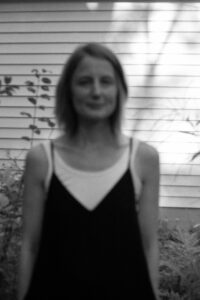
The other day I went to the library to pick up some books I must have requested and awaiting me was a book on time management (“feel less busy while getting more done”) and a book just called Men. I thought, well, that about covers it.
My writing is often about the reading and role of journalism and I often wish I’d been a journalist (while knowing I’m not suited for it). So works like Patrick Radden Keefe’s Say Nothing enthrall me and kill me.
Oh gosh. Well, I’m a real small-press girl. I like the DIY spirit, the horizontal, the grassroots, the surviving in-spite-of, in-the-shadow-of huge corporations. At the moment there’s a bit of a trend toward embracing institutional and corporate affirmation and that is not my favorite trend because I think you can’t build enough with it—although sometimes people convince me that it can be a useful tactic. I also miss the dynamics in literature (surely they happened in too limited ways and we must invent new ones) when writing didn’t take the self for granted, but rather enacted its skepticism that we could know what the self was or trust what we were told about it, even by ourselves. This also meant a lot of skepticism toward received forms and the stability of any discourse. I find that energy pretty liberating. I don’t find conventional psychological realism that convincing, for how unshakeable its cultural reign seems to be. “Motivation” and “backstory” really do not mean as much as in our lives as our current narrative trends insist they do—and this emphasis on the individual serves to distract us, I think, from systems and the workings of power.
Because I’ve worked as an editor for almost 20 years, I reread quite a lot—by the time a manuscript I’ve acquired or worked on comes out as a book in the world, I’ve read it 3–6 times. Yet sometimes I feel like I haven’t even read it yet, because the reception that follows can be so lively and multifaceted and illuminating, so I feel like I should immediately reread again. Otherwise, beyond editing projects, my best guesses are Austen’s Pride and Prejudice and Stephen Graham Jones’s Ledfeather. Back in the day I bet I read The Lord of the Rings a million times but I mostly remember the landscapes now, though I think they bored me then.
For me it wasn’t about spending, but not-earning. It helped me a lot in my life when I got to the point when I could turn down all the side gigs, the freelance projects, and didn’t have to just keep saying yes to every email. I mean, I guess what I’m saying is that it helps with being a writer and also just a person, a human being, when you can work one steady job with health insurance and not like seven or eight tiny jobs with no health insurance.
Hilary Plum is the author of several books, including the essay collection Hole Studies (Fonograf Editions, 2022), the novel Strawberry Fields (Fence, 2018), and the work of nonfiction Watchfires (Rescue Press, 2016), which won the GLCA New Writers Award. A collection of poetry, Excisions, is forthcoming from Black Lawrence Press in 2023. She teaches at Cleveland State University and is associate director of the CSU Poetry Center. With Zach Savich she edits the Open Prose Series at Rescue Press.
Find more information on Plum’s latest book Hole Studies here: http://www.hilaryplum.com/hole-studies.html


